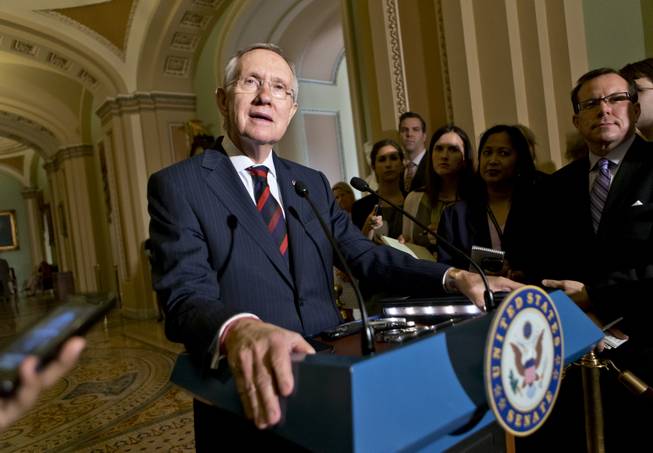
J. Scott Applewhite / AP
Senate Majority Leader Harry Reid updates reporters on the pace of the immigration reform bill following a Democratic strategy session, Tuesday, June 25, 2013, on Capitol Hill in Washington.
Published Wednesday, June 26, 2013 | 12:41 p.m.
Updated Wednesday, June 26, 2013 | 1:33 p.m.
WASHINGTON — Far-reaching immigration legislation cruised toward passage in the Senate on Wednesday as House Republicans pushed ahead on a different approach that cracks down on millions living in the United States illegally rather than offering them a chance at citizenship.
Presidential politics took a more prominent role in a long-running national debate as Sen. Marco Rubio, a Republican, tried to reassure conservatives that many of the criticisms of the bill, which he helped write, are "just not true."
The potential 2016 White House contender said in remarks on the Senate floor it has been difficult for him "to hear the worry and the anxiety and the growing anger in the voices of so many people who helped me get elected to the Senate and who I agree with on virtually every other issue."
The political impact of the issue aside, there was no doubt that the White House-backed Senate bill was on track for passage by Thursday or Friday. President Barack Obama would like to have an immigration bill passed by Congress so he can point to a major legislative success in the first year of his second term.
Supporters posted 67 votes or more on each of three procedural tests Wednesday, far more than the 60 needed to prevail in the 100-member chamber. More than a dozen Republicans sided with Democrats on each, assuring bipartisan support that the bill's backers hope will change minds in the House.
At its core, the legislation includes numerous steps to prevent future illegal immigration, while at the same time it offers a chance at citizenship for millions living in the country illegally.
It provides for 20,000 new Border Patrol agents, requires the completion of 700 miles (1,226 kilometers) of fencing and requires an array of high-tech devices be deployed to secure the border with Mexico.
Businesses would be required to check on the legal status of prospective employees. The government would be ordered to install a high-tech system to check on the comings and goings of foreigners at selected international airport in the United States.
Other provisions would expand the number of visas for highly skilled workers relied upon by the technology industry. A separate program would be established for lower-skilled workers, and farm workers would be admitted under a temporary program.
Some farm workers who are in the country illegally can qualify for a green card, which bestows permanent residency status, in five years.
Many of the bill's supporters also cheered a ruling from the Supreme Court that said married gay couples are entitled to the same federal benefits as heterosexual couples. They said the decision would probably allow gay married citizens or permanent residents to sponsor their spouses for U.S. residency.
The basic legislation was drafted by four Democrats and four Republicans who met privately for months to produce a rare bipartisan compromise in a polarized Senate. They fended off unwanted changes in the Senate Judiciary Committee, and then were involved in negotiations with Republican Sens. John Hoeven and Bob Corker on a package of tougher border security provisions that swelled support among Republicans.
In the House, an attempt at a bipartisan deal faltered, and majority Republicans began moving ahead on legislation tailored to the wishes of conservatives and vehemently opposed by Democrats.
The House Judiciary Committee already has approved two measures and was at work on a third during the day as it followed a piecemeal path rather than the all-in-one approach of the Senate.
The House bill under consideration Wednesday would require businesses to check on the legal status of employees within two years, as compared with four in the Senate measure.
One of the bills approved earlier makes it a new crime to remain in the country without legal status. It also allows state and local governments to enforce federal immigration laws, an attempt to apprehend more immigrants living in the United States illegally. It encourages those living in the United States unlawfully to depart voluntarily.
The second bill that cleared last week deals with farm workers who come to the United States temporarily with government permission. Unlike the Senate legislation, it offers no pathway to citizenship.
With attention beginning to shift to the House, Rep. John Fleming, a Republican, said House Speaker John Boehner, also Republican, had assured the rank and file they will vote on bills being written in the House. "We are not going to take up the Senate bill," Fleming said, quoting the speaker.
Internal divisions among Republicans, combined with overwhelming opposition among Democrats, recently sent a farm bill down to defeat in the House, and it is unclear if the Republicans will be able to command a majority for its own approach to immigration legislation.
At the same time, rules generally guarantee Democrats a chance to have the full House vote on its own alternatives, and it is unclear whether they might seek the vote on the Senate bill that Republicans hope to avoid.

Join the Discussion:
Check this out for a full explanation of our conversion to the LiveFyre commenting system and instructions on how to sign up for an account.
Full comments policy